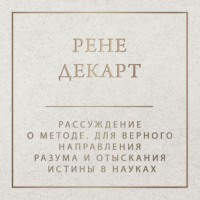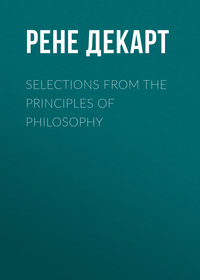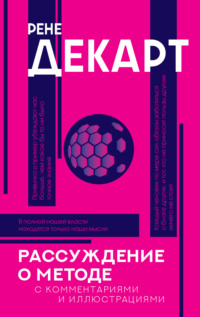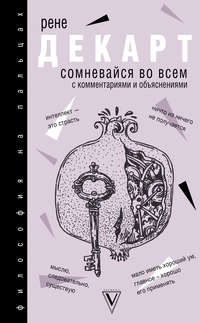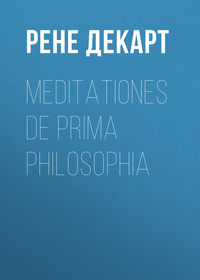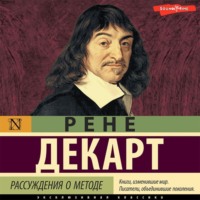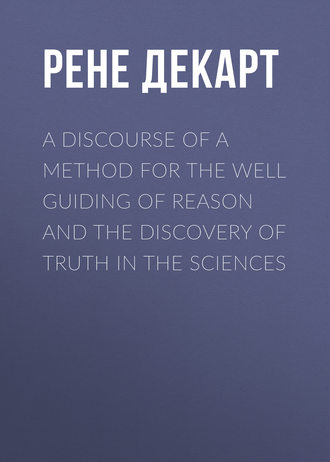 полная версия
полная версияA Discourse of a Method for the Well Guiding of Reason and the Discovery of Truth in the Sciences
After this I considered in generall what is requisite in a Proposition to make it true and certain: for since I had found out one which I knew to be so, I thought I ought also to consider wherein that certainty consisted: and having observed, That there is nothing at all in this, I think, therefore I am, which assures me that I speak the truth, except this, that I see most cleerly, That to think, one must have a being; I judg’d that I might take for a generall rule, That those things which we conceive cleerly and distinctly, are all true; and that the onely difficulty is punctually to observe what those are which we distinctly conceive.
In pursuance whereof, reflecting on what I doubted, and that consequently my being was not perfect; for I clearly perceived, that it was a greater perfection to know, then to doubt, I advised in my self to seek from whence I had learnt to think on something which was more perfect then I; and I knew evidently that it must be of some nature which was indeed more perfect. As for what concerns the thoughts I had of divers other things without my self, as of heaven, earth, light, heat, and a thousand more, I was not so much troubled to know whence they came, for that I observed nothing in them which seemed to render them superiour to me; I might beleeve, that if they were true, they were dependancies from my nature, as far forth as it had any perfection; and if they were not, I made no accompt of them; that is to say, That they were in me, because I had something deficient. But it could not be the same with the Idea of a being more perfect then mine: For to esteem of it as of nothing, was a thing manifestly impossible. And because there is no lesse repugnancy that the more perfect should succeed from and depend upon the less perfect, then for something to proceed from nothing, I could no more hold it from my self: So as it followed, that it must have bin put into me by a Nature which was truly more perfect then I, and even which had in it all the perfections whereof I could have an Idea; to wit, (to explain my self in one word) God. Whereto I added, that since I knew some perfections which I had not, I was not the onely Being which had an existence, (I shall, under favour, use here freely the terms of the Schools) but that of necessity there must be some other more perfect whereon I depended, and from whom I had gotten all what I had: For had I been alone, and depending upon no other thing, so that I had had of my self all that little which I participated of a perfect Being, I might have had by the same reason from my self, all the remainder which I knew I wanted, and so have been my self infinite, eternall, immutable, all-knowing, almighty; and lastly, have had all those perfections which I have observed to be in God. For according to the way of reasoning I have now followed, to know the nature of God, as far as mine own was capable of it, I was onely to consider of those things of which I found an Idea in me, whether the possessing of them were a perfection or no; and I was sure, that any of those which had any imperfections were not in him, but that all others were. I saw that doubtfulness, inconstancy, sorrow and the like, could not be in him, seeing I could my self have wish’d to have been exempted from them. Besides this, I had the Ideas of divers sensible and corporeall things; for although I supposed that I doted, and that all that I saw or imagined was false; yet could I not deny but that these Ideas were truly in my thoughts. But because I had most evidently known in my self, That the understanding Nature is distinct from the corporeall, considering that all composition witnesseth a dependency, and that dependency is manifestly a defect, I thence judged that it could not be a perfection in God to be composed of those two Natures; and that by consequence he was not so composed. But that if there were any Bodies in the world, or els any intelligences, or other Natures which were not wholly perfect, their being must depend from his power in such a manner, that they could not subsist one moment without him.
Thence I went in search of other Truths; and having proposed Geometry for my object, which I conceived as a continued Body, or a space indefinitely spred in length, bredth, height or depth, divisible into divers parts, which might take severall figures and bignesses, and be moved and transposed every way. For the Geometricians suppose all this in their object. I past through some of their most simple demonstrations; and having observed that this great certaintie, which all the world grants them, is founded only on this, that men evidently conceived them, following the rule I already mentioned. I observed also that there was nothing at all in them which ascertain’d me of the existence of their object. As for example, I well perceive, that supposing a Triangle, three angles necessarily must be equall to two right ones: but yet nevertheless I saw nothing which assured me that there was a Triangle in the world. Whereas returning to examine the Idea which I had of a perfect Being, I found its existence comprised in it, in the same manner as it was comprised in that of a Triangle, where the three angles are equall to two right ones; or in that of a sphere, where all the parts are equally distant from the center. Or even yet more evidently, and that by consequence, it is at least as certain that God, who is that perfect Being, is, or exists, as any demonstration in Geometry can be.
But that which makes many perswade themselves that there is difficulty in knowing it, as also to know what their Soul is, ’tis that they never raise their thoughts beyond sensible things, and that they are so accustomed to consider nothing but by imagination, which is a particular manner of thinking on materiall things, that whatsoever is not imaginable seems to them not intelligible. Which is manifest enough from this, that even the Philosophers hold for a Maxime in the Schools, That there is nothing in the understanding which was not first in the sense; where notwithstanding its certain, that the Ideas of God and of the Soul never were. And (me thinks) those who use their imagination to comprehend them, are just as those, who to hear sounds, or smell odours, would make use of their eys; save that there is yet this difference, That the sense of seeing assures us no lesse of the truth of its objects, then those of smelling or hearing do: whereas neither our imagination, nor our senses, can ever assure us of any thing, if our understanding intervenes not.
To be short, if there remain any who are not enough perswaded of the existence of God, and of their soul, from the reasons I have produc’d, I would have them know, that all other things, whereof perhaps they think themselves more assured, as to have a body, and that there are Stars, and an earth, and the like, are less certain. For although we had such a morall assurance of these things, that without being extravagant we could not doubt of them. However, unless we be unreasonable when a metaphysicall certainty is in question, we cannot deny but we have cause enough not to be wholly confirmed in them, when we consider that in the same manner we may imagine being asleep, we have other bodies, and that we see other Stars, and another earth, though there be no such thing. For how doe we know that those thoughts which we have in our dreams, are rather false then the others, seeing often they are no less lively and significant, and let the ablest men study it as long as they please, I beleeve they can give no sufficient reason to remove this doubt, unless they presuppose the existence of God. For first of all, that which I even now took for a rule, to wit, that those things which were most clearly and distinctly conceived, are all true, is certain, only by reason, that God is or exists, and that he is a perfect being, and that all which we have comes from him. Whence it follows, that our Idea’s or notions, being reall things, and which come from God in all wherein they are clear and distinct, cannot therein be but true. So that if we have very often any which contain falshood, they cannot be but of such things which are somewhat confus’d and obscure, because that therein they signifie nothing to us, that’s to say, that they are thus confus’d in us only, because we are not wholly perfect. And it’s evident that there is no less contrariety that falshood and imperfection should proceed from God, as such, then there is in this, that truth and falshood proceed from nothing. But if we know not that whatsoever was true and reall in us comes from a perfect and infinite being, how clear and distinct soever our Idea’s were, we should have no reason to assure us, that they had the perfection to be true.
Now after that the knowledge of God, and of the Soul hath rendred us thus certain of this rule, it’s easie to know; that the extravaganceys which we imagin in our sleep, ought no way to make us doubt of the truth of those thoughts which we have being awake: For if it should happen, that even sleeping we should have a very distinct Idea; as for example, A Geometritian should invent some new demonstration, his sleeping would not hinder it to be true. And for the most ordinary error of our dreames, which consists in that they represent unto us severall objects in the same manner as our exterior senses doe, it matters not though it give us occasion to mistrust the truth of those Ideas, because that they may also often enough cozen us when we doe not sleep; As when to those who have the Jaundies, all they see seems yellow; or, as the Stars or other bodies at a distance, appear much less then they are. For in fine, whether we sleep or wake, we ought never to suffer our selves to be perswaded but by the evidence of our Reason; I say, (which is observable) Of our Reason, and not of our imagination, or of our senses. As although we see the Sun most clearly, we are not therefore to judge him to be of the bigness we see him of; and we may well distinctly imagine the head of a Lion, set on the body of a Goat, but therefore we ought not to conclude that there is a Chimera in the world. For reason doth not dictate to us, that what we see or imagine so, is true: But it dictates, that all our Idea’s or notions ought to have some grounds of truth; For it were not possible, that God who is all perfect, and all truth, should have put them in us without that: And because that our reasonings are never so evident, nor so entire while we sleep, as when we wake, although sometimes our imaginations be then as much or more lively and express. It also dictates to us, that our thoughts, seeing they cannot be all true by reason that we are not wholly perfect; what they have of truth, ought infallibly to occur in those which we have being awake, rather then in our dreams.
PART. V
I should be glad to pursue this Discourse, and shew you the whole Series of the following Truths, which I have drawn from the former: But because for this purpose, it were now necessary for me to treat of severall questions, which are controverted by the learned, with whom I have no desire to imbroil my self, I beleeve it better for me to abstain from it; and so in generall onely to discover what they are, that I may leave the wisest to judge whether it were profitable to inform the publick more particularly of them. I alwayes remained constant to my resolution, to suppose no other Principle but that which I now made use of, for the demonstration of the Existence of God, and of the Soul; and to receive nothing for true, which did not seem to me more clear and more certain then the demonstrations of Geometry had formerly done. And yet I dare say, that I have not onely found out the means to satisfie my self, in a short time, concerning all the principall difficulties which are usually treated in Philosophy. But that also I have observed certain Laws which God hath so established in Nature, and of which he hath imprinted such notions in our Souls, that when we shall have made sufficient reflections upon them we cannot doubt but that they are exactly observed in whatsoever either is, or is done in the World. Then considering the connexion of these Laws, me thinks, I have discovercd divers Truths, more usefull and important then whatever I learn’d before, or ever hop’d to learn.
But because I have endeavoured to lay open the principall of them in a Treatise, which some considerations hinder me from publishing; I can no way better make them known, then by relating summarily what it contains.
I had a designe to comprehend all what I thought I knew, before I would write it, touching the nature of material things. But even as Painters, not being able equally well to represent upon a flat all the severall facies of a solid body, chuse the principall of them, which they place towards the light; and shadowing the others, make them appear no more then they do to our sight: So, fearing lest I should not bring into this Discourse all which was in my thoughts, I onely undertook to set forth at large my conceptions touching the light; and upon that occasion to add somewhat of the Sun, and of the fix’d Stars, by reason that it proceeds almost all from thence; of the Heavens, because they transmit it; of the Planets, of the Comets, and of the Earth, because they cause it to reflect; and in particular, of all Bodies which are on the earth, whether for that they are either coloured, or transparent, or luminous; and last of all, of Man, because he is the Spectator thereof. As also, in some manner to shadow out all these things, and that I might the more freely speak what I judg’d, without being obliged to follow, or to refute the opinions which are received amongst the Learned, I resolved to leave all this world here to their disputes, and to speak onely of what would happen in a new one, if God now created some where in those imaginary spaces matter enough to compose it, and that he diversly and without order agitated the severall parts of this matter, so as to compose a Chaos of it as confused as the Poets could feign one: and that afterwards he did nothing but lend his ordinary concurrence to Nature, and leave her to work according to the Laws he hath established.
Thus first of all I described this Matter, and endevoured to represent it such, that me thinks there is nothing in the world more clear, or more intelligible, except what was beforesaid of God, and of the Soul. For even I expresly supposed that there was in it none of those forms and qualities which are disputed in the Schools; nor generally any thing but that the knowledge thereof was so naturall to our understandings, that we could not even feigne to be ignorant of it. Besides, I made known what the Laws of Nature were; and without grounding my reasons on any other principles, but on the infinite perfections of God, I did endeavour to demonstrate all those which might be questioned, and to make them appear to be such, that although God had created divers worlds, there could have been none where they were not observed. Afterwards I shewed how the greater part of the Matter of this Chaos ought, according to those Laws, to dispose and order it self in a certain manner, which would make it like our Heavens: And how some of these parts were to compose an Earth, and some Planets and Commets, some others a Sun and fix’d Starrs. And here enlarging my self on the subject of Light, I at length explain’d what that light was, which was to be in the Sun and Stars; and thence how it travers’d in an instant the immense spaces of the Heavens, and how it reflected it self from Planets and Commets towards the Earth. I added also divers things touching the substance, situation, the motions, and all the several qualities of these heavens and these stars: So that I thought I had said enough to make known, That there is nothing remarkable in those of this world, which ought not, or at least could not appear altogether like to these of that world which I described.
Thence I came to speak particularly of the Earth; how, although I had expresly supposed, that God had placed no weight in the Matter whereof it was composed; yet all its parts exactly tended towards its center: How that there being water and air upon its superficies, the disposition of the Heavens, and of the Starrs, and chiefly of the Moon, ought to cause a floud and an ebb, which in all circumstances was like to that which we observe in our Seas; And besides, a certain course aswel of the water, as of the air, from East to West, as is also observed between the Tropicks: How the Mountains, the Seas, the Springs and Rivers might naturally be form’d therein, and Metals run in the mines, and Plants grow in the Fields, and generally all bodies be therein engendered which are call’d mixt or composed.
And amongst other things, because that next the Stars, I know nothing in the world but Fire, which produceth light, I studied to make all clearly understood which belongs to its nature; how it’s made, how it’s fed, how sometimes it hath heat onely without light, and sometimes onely light without heat; how it can introduce several colours into several bodies, and divers other qualities; how it dissolves some, and hardens others; how it can consume almost all, or convert them into ashes and smoak: and last of all, how of those ashes, by the only violence of its action, it forms glass. For this transmutation of ashes into glass, seeming to me to be as admirable as any other operation in Nature, I particularly took pleasure to describe it.
Yet would I not inferre from all these things, that this World was created after the manner I had proposed. For it is more probable that God made it such as it was to be, from the beginning. But it's certain, and 'tis an opinion commonly received amongst the Divines, That the action whereby he now preserveth it, is the same with that by which he created it. So that, although at the beginning he had given it no other form but that of a Chaos (provided, that having established the Laws of Nature, he had afforded his concurrence to it, to work as it used to do) we may beleeve (without doing wrong to the miracle of the Creation) that by that alone all things which are purely material might in time have rendred themselves such as we now see them: and their nature is far easier to conceive, when by little and little we see them brought forth so, then when we consider them quite form’d all at once.
From the description of inanimate Bodies and Plants, I pass’d to that of Animals, and particularly to that of Men. But because I had not yet knowledge enough to speak of them in the same stile as of the others; to wit, in demonstrating effects by their causes, and shewing from what seeds, and in what manner Nature ought to produce them; I contented my self to suppose, That God form’d the body of a Man altogether like one of ours; aswel the exteriour figure of its members, as in the interiour conformity of its organs; without framing it of other matter then of that which I had described; and without putting in it at the beginning any reasonable soul, or any other thing to serve therein for a vegetative or sensitive soul; unless he stirr’d up in his heart one of those fires without light which I had already discovered; and that I conceiv’d of no other nature but that which heats hay when its housed before it be dry, or which causes new Wines to boyl when it works upon the grape: For examining the functions which might be consequently in this body, I exactly found all those which may be in us, without our thinking of them; and to which our soul (that is to say, that distinct part from our bodies, whose nature (as hath been said before) is onely to think) consequently doth not contribute, and which are all the same wherein we may say unreasonable creatures resemble us. Yet could I not finde any, of those which depending from the thought, are the onely ones which belong unto us as Men; whereas I found them all afterwards, having supposed that God created a reasonable soul, and that he joyn’d it to this body, after a certain manner which I describ’d.
But that you might see how I treated this matter, I shall here present you with the explication of the motion of the heart, and of the arteries, which being the first and most general (which is observed in animals) we may thereby easily judge what we ought to think of all the rest. And that we may have the less difficulty to understand what I shall say thereof, I wish those who are not versed in Anatomy, would take the pains, before they read this, to cause the heart of some great animal which hath lungs, to be dissected; for in all of them its very like that of a Man: and that they may have shewn them the two cels or concavities which are there: First that on the right side, whereto two large conduits answer, to wit, the vena cava, which is the principal receptacle of bloud, and as the body of a tree, whereof all the other veins of the body are branches; and the arterious vein, which was so mis-call’d, because that in effect its an artery, which taking its origine from the heart, divides it self after being come forth, into divers branches, which every way spred themselves through the lungs. Then the other which is on the left side, whereunto in the same manner two pipes answer, which are as large, or larger then the former; to wit, the veinous artery, which was also il named, forasmuch as its nothing else but a vein which comes from the lungs, where its divided into several branches interlaid with those of the arterious vein, and those of that pipe which is called the Whistle, by which the breath enters. And the great artery, which proceeding from the heart, disperseth its branches thorow all the body. I would also that they would carefully observe the eleven little skins, which, as so many little doors, open and shut the four openings which are in these two concavities; to wit, three at the entry of the vena cava, where they are so disposed, that they can no wayes hinder the bloud which it contains from running into the right concavity of the heart; and yet altogether hinder it from coming out. Three at the entry of the arterious vein; which being disposed quite contrary, permit only the bloud which is in that concavity to pass to the lungs; but not that which is in the lungs to return thither. And then two others at the entry of the veinous artery, which permits the bloud to run to the left concavity of the heart, but opposeth its return. And three at the entry of the great artery, which permit it to go from the heart, but hinder its return thither. Neither need we seek any other reason for the number of these skins, save only that the opening of the veinous artery, being oval-wise, by reason of its situation, may be fitly shut with two; whereas the other, being round, may the better be clos’d with three. Besides, I would have them consider, that the great artery and the arterious vein are of a composition much stronger then the veinous artery or the vena cava. And that these two later grow larger before they enter into the heart, and make (as it were) two purses, call’d the ears of the heart, which are composed of a flesh like it; and that there is always more heat in the heart then in any other part of the body. And in fine, that if any drop of bloud enter into these concavities, this heat is able to make it presently swell and dilate it self, as generally all liquors do, when drop by drop we let them fall into a very hot vessel.
For after this I need say no more for to unfold the motion of the heart, but that when these concavities are not full of bloud, necessarily there runs some from the vena cava into the right, and from the veinous artery into the left; for that these two vessels are always full of it, and that their openings which are towards the heart cannot then be shut: But that assoon as there is thus but two drops of bloud entred, one in either of these concavities, these drops, which cannot but be very big, by reason that their openings whereby they enter are very large, and the vessels whence they come very full of bloud, are rarified and dilated because of the heat which they find therein. By means whereof, causing all the heart to swel, they drive and shut the five little doors which are at the entry of the two vessels whence they come, hindering thereby any more bloud to fall down into the heart, and continuing more and more to rarifie themselves, they drive and open the six other little doors which are at the entry of the other two vessels whence they issue, causing by that means all the branches of the arterious vein, and of the great artery, to swel (as it were) at the same time with the heart: which presently after fals, as those arteries also do, by reason that the bloud which is entred therein grows colder, and their six little doors shut up again, and those five of the vena cava, and of the veinous artery open again, and give way to two other drops of bloud, which again swell the heart and the arteries in the same manner as the preceding did. And because the bloud which thus enters into the heart, passeth thorow those two purses, which are call’d the ears; thence it comes, that their motion is contrary to the heart’s, and that they fall when that swels.


